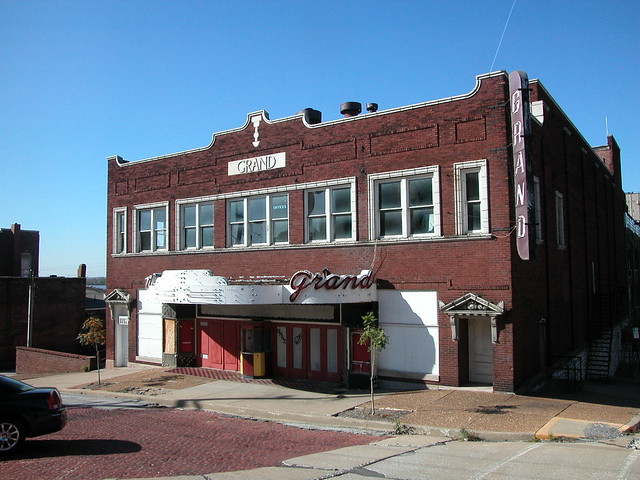by Michael R. Allen

Yesterday, the Alton City Council voted 6-1 to overturn the city landmark designation recently conferred by the Historical Commission upon the Grand Theater. The theater, at the corner of Third and Market streets, has been owned by businessman Ed McPike since 1990. There is one tenant in a basement storefront on Third Street. McPike opposed the landmark nomination prepared by citizen Bill McKenzie.
After the Historical Commission voted 4-2 to confer designation, McPike appealed. Under Alton’s preservation ordinance, that appeal went to the City Council, which was then allowed to consider new evidence. Apparently, given yesterday’s decision, the council also has the authority to not only consider new evidence but also to impose a new standard of review.
Many concerned citizens, including McKenzie and Alton Area Landmarks Association President Terry Sharp, spoke in favor of upholding the Historical Commission’s brave decision. I spoke to clarify several points, including how — based on my St. Louis experience — landmark designation does not preclude reasonable alteration or even, if justified, demolition. In fact, the Alton Historical Commission recently granted demolition for the city’s oldest house, the Mansion House, after a devastating fire. Preservationists thought that the Mansion House could be saved, but the Historical Commission did not. Landmark designation simply ensures that the decision to demolish a historic building receives deliberation; it does not compel preservation in every case.
Alderman Mike Velloff, the lone dissenter, made the point that the level of review brought by the designation was no more arduous than what the Council would put in place for anyone seeking an official redevelopment plan. McPike’s attorney Jim Sinclair had called the landmark status a “taking” of the property.
While the Council overturned the landmark designation, the strong advocacy campaign for the Grand Theater has drawn a lot of attention to the long-vacant building. Hopefully that will lead McPike or a future owner to consider preservation.

5 replies on “Alton City Council Reverses Grand Theater Landmark Designation”
is mcpike currently considering demolition?
In his testimony yesterday, McPike outlined no immediate plans for the building. He did state that he thought that the building was beyond rehabilitation, but not that he wanted to tear it down.
“Jim Sinclair had called the landmark status a “taking†of the property.” Ruh-roh, conservative Western States Legal Defense fan alert. Sound the coo-coo alarm, stat! As the other councilman pointed out, determining landmark status is no different than reviewing a building design plan, or a development plan. Frankly, though, I don’t think these supposed rights exist. No one has, nor should have, the right to do anything they damn well please to or on their property without seeking the imprimatur of society. From a landmark theater to upgrades and alterations to a coal-fired power plant to a refinery. Established law suggests we have a right as citizens to oversee the dispensation of property, and most buildings and activities on said property. Certainly this is the case if said activities or operations affect other property owners and the community at large. Mr. Sinclair is merely parroting (PR)opaganda originated by the conservative right and corporate interests.
well, duh…
Actually, your points are well received, and I wish there were a palatable way to state what’s obvious to those sensitive to urban environments and why those environments are urban, but how to impel those that only see a plastic hotel or cast pewter shoe on the Monopoly playing board is tough. Progressives demand progress, which includes the betterment or revival of urbanity where urban environments occur. Conservatives (who don’t conserve much) don’t care.